Top 12 6sense Alternatives: Best Account-Based Intelligence Platforms 2025
Affordable, fast, and comprehensive 6sense alternatives for 2025 ABM success.
Blogby JanMay 30, 2025

Account-based intelligence shouldn't require a six-figure investment or months of implementation. Most revenue teams seek platforms that offer accessible budgets, straightforward setup processes, and user-friendly expertise that enables timely buyer insights.
The reality facing modern B2B organizations is notable: while 73% of buyers now research solutions anonymously before engaging with sales teams, many account intelligence platforms remain challenging to access due to cost and complexity considerations.
Here's what you need to know about the top 6sense alternatives in 2025:
| Platform | Ideal For | Monthly Investment | ABM Focus |
| Databar.ai | Multi-source account intelligence | From $39 | Excellent |
| Demandbase | Enterprise ABM programs | From $2,500 | Good |
| ZoomInfo | Integrated sales intelligence | From $1,250 | Excellent |
| Terminus | Mid-market ABM automation | From $1,000 | Very Good |
| Bombora | Intent data specialists | Custom pricing | Good |
This analysis examines why forward-thinking revenue teams are exploring beyond 6sense's enterprise-focused approach to find accessible, flexible account intelligence solutions. You'll discover which platform aligns best with your team size, technical capabilities, and strategic account-based marketing objectives.
Why Revenue Teams Are Seeking 6sense Alternatives
6sense has established itself as a leader in account-based experience (ABX) and revenue intelligence, using AI to identify anonymous buyer behavior and predict account engagement timing.
What 6sense does well:
- Advanced AI algorithms for anonymous buyer behavior identification and analysis
- Sophisticated account scoring and buying stage prediction capabilities
- Integration with enterprise marketing automation platforms
- Deep analytics and reporting for account engagement patterns and revenue attribution
- Proven track record with large enterprise ABM programs and complex sales cycles
However, several considerations drive teams to explore alternatives.
Enterprise-focused accessibility creates considerations for growing companies and mid-market organizations. 6sense typically requires annual investments exceeding multiple five figures for meaningful functionality, which may put advanced account intelligence beyond reach for most teams building their ABM capabilities.
Implementation requirements can extend time-to-value for organizations needing immediate buyer insights. The platform often requires 3-6 months for effective deployment, involving extensive data integration, account mapping, and workflow configuration that many teams may find challenging to support without dedicated marketing operations resources.
Technical resource considerations may affect teams with varying levels of specialized expertise in marketing automation, data analytics, and ABM orchestration. 6sense optimization typically requires ongoing technical management that smaller marketing teams may find demanding to provide effectively.
Customization scope in data sources and configuration options may not fully accommodate teams with unique industry requirements or specialized buyer research patterns. The platform's proprietary approach may not always align with organizations needing specific data sources or custom intelligence workflows.
Integration prerequisites typically require mature marketing technology stacks with established CRM, marketing automation, and sales engagement platforms. Teams with simpler technology environments may find 6sense integration comprehensive or potentially incompatible with their current capabilities.
These considerations have created demand for accessible, transparent account intelligence solutions that provide immediate value without enterprise complexity or extensive resource requirements.
1. Databar.ai
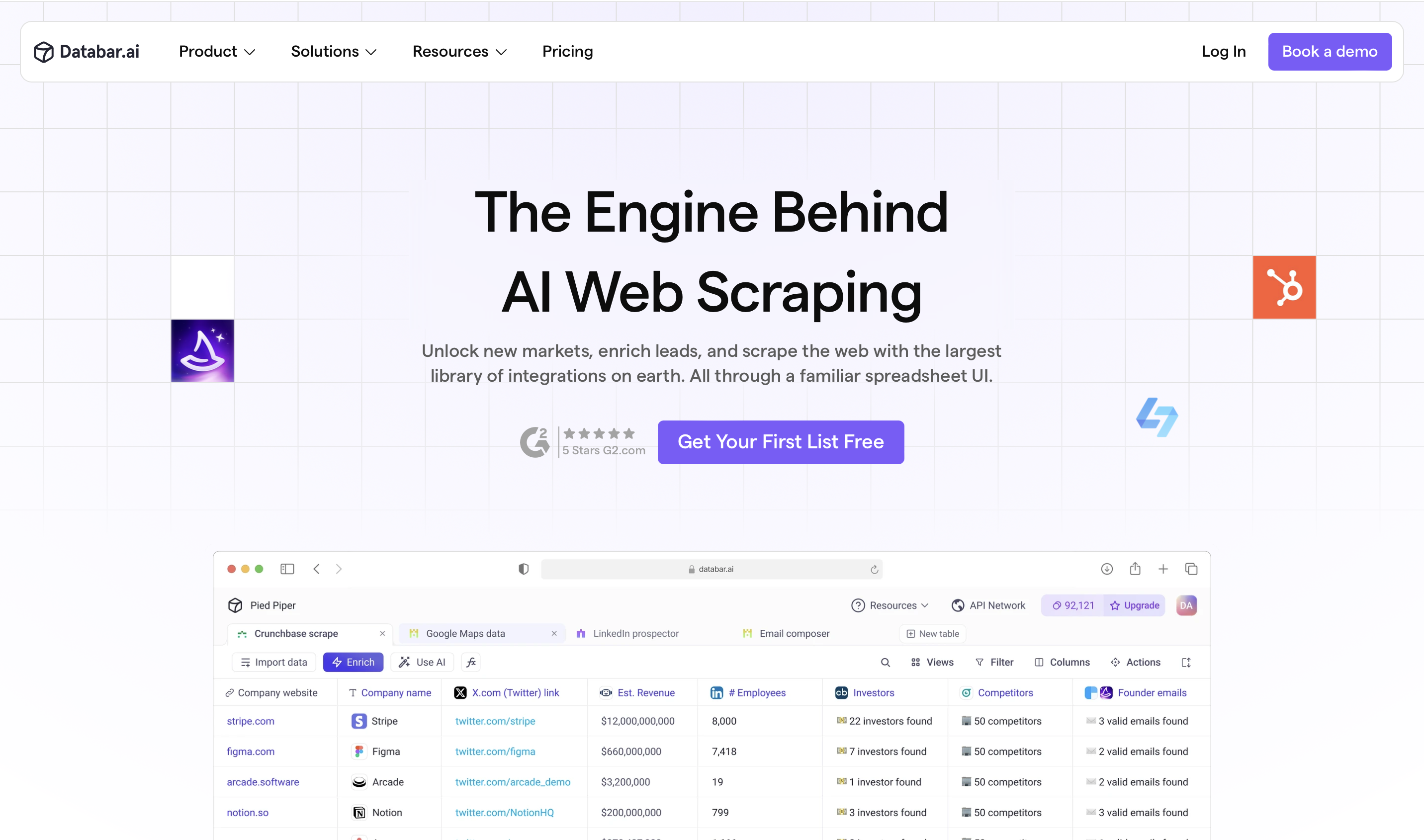
Databar.ai modernizes account intelligence by aggregating insights from over 90 specialized providers while maintaining the simplicity and accessibility that growing teams require for effective account-based strategies.
Why Databar.ai offers advantages for most organizations:
Immediate implementation value eliminates the weeks-long deployment cycles that can delay effectiveness. Teams can begin identifying high-intent accounts and gathering buyer intelligence within hours rather than waiting for complex integration projects and extensive account mapping processes.
Extensive data coverage comes from accessing dozens of specialized data sources rather than relying solely on proprietary algorithms. While 6sense analyzes website behavior and content engagement, Databar.ai combines multiple signals including hiring patterns, funding announcements, technology adoptions, competitive intelligence, and multiple other account signals automatically.
Transparent, accessible pricing starts at $39 monthly with clear usage-based scaling, making sophisticated account intelligence available to growing companies and small teams. This represents a fraction of 6sense's enterprise requirements while often providing broader signal coverage and more actionable insights.
Contact-level actionability combines account intelligence with decision-maker identification and verified contact information. Unlike 6sense's account-focused approach, which may require separate tools to identify prospects, teams receive comprehensive intelligence that includes decision makers at companies showing buying signals, along with their contact details for immediate outreach.
Global market coverage includes intelligence from international markets and non-English sources that expand beyond 6sense's primarily North American and English-language focus. Teams pursuing international expansion benefit from local market insights.
Flexible integration options accommodate teams with various technology maturity levels, from simple CSV exports to sophisticated API integrations. Teams can begin benefiting from account intelligence regardless of their current marketing technology sophistication.
AI-powered research automation goes beyond basic account scoring to provide contextual insights about organizational priorities, recent developments, and strategic initiatives that drive buying decisions. The platform's research agent analyzes company websites, recent announcements, and market positioning to identify specific pain points and opportunity signals.
Start your free trial with Databar.ai →
Account Intelligence: Beyond Traditional Lead Generation
Modern B2B buyers conduct extensive anonymous research before engaging with sales teams, making traditional lead generation approaches increasingly less effective. Account intelligence platforms address this challenge by identifying and analyzing buyer behavior patterns that occur before prospects reveal themselves through form submissions or direct inquiries.
The evolution from lead-based to account-based intelligence reflects fundamental changes in B2B buying behavior. Individual leads often lack decision-making authority, while account-level intelligence reveals organizational buying patterns and committee dynamics that drive actual purchase decisions.
Anonymous buyer behavior analysis has become critical as buyers complete significant portions of their research journey without directly engaging with vendors. For comprehensive company intelligence, account intelligence platforms identify these hidden research patterns and predict optimal engagement timing.
Multi-stakeholder buying committees require approaches that understand organizational dynamics rather than individual contact behavior. Modern platforms analyze engagement patterns across multiple stakeholders within target accounts to identify buying stage progression and decision-maker influence.
2. Demandbase
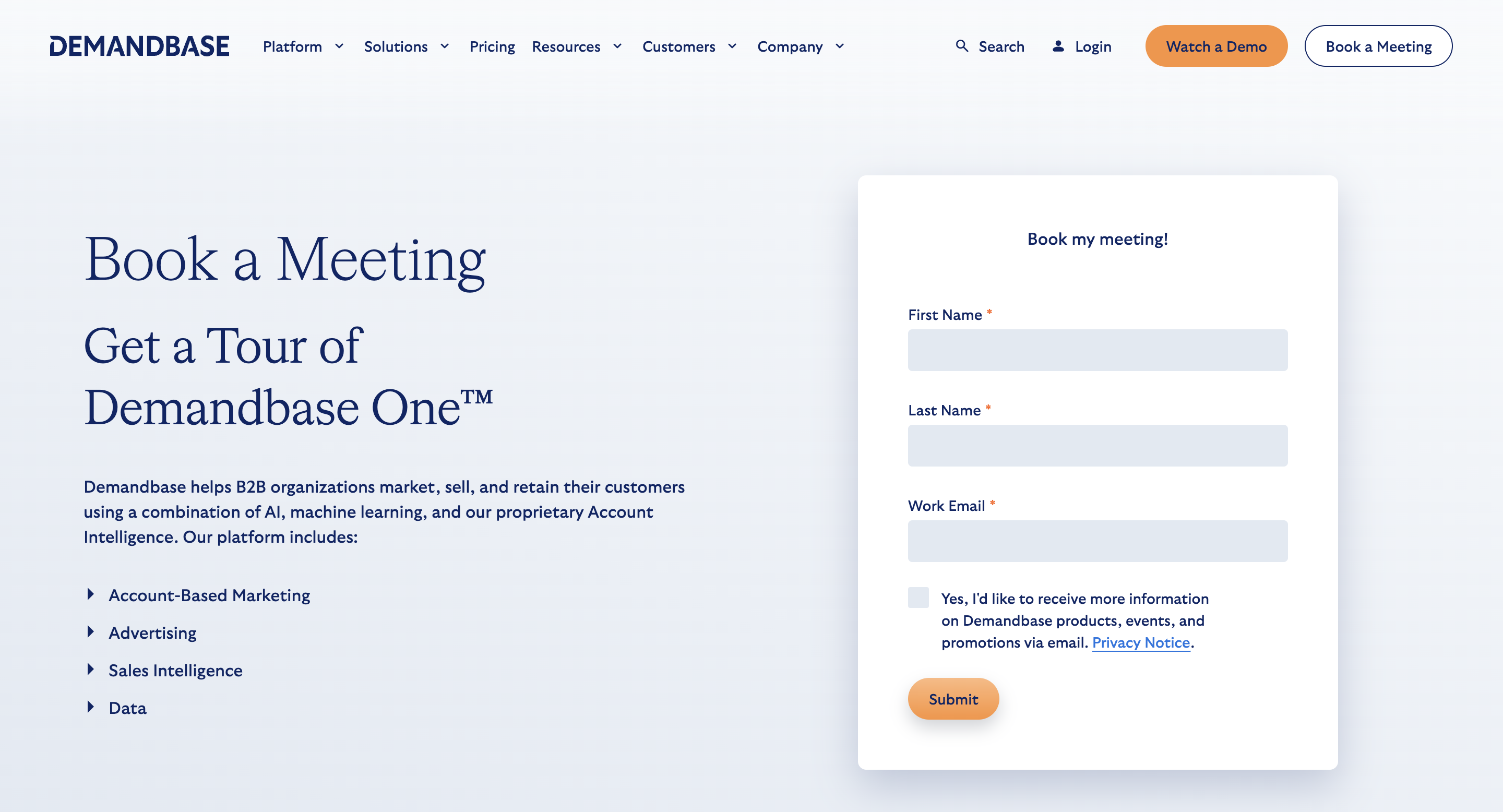
Demandbase positions itself as a robust account-based marketing platform, combining account intelligence with sophisticated campaign orchestration and engagement automation for large marketing organizations.
Comprehensive ABM integration capabilities:
Demandbase integrates account intelligence with marketing automation, advertising orchestration, and sales engagement tools to provide coordinated account-based experiences across all buyer touchpoints and engagement channels.
The platform's account journey tracking combines behavioral intelligence with engagement history to provide comprehensive views of buyer progression and strategic recommendations for optimal next-step engagement.
Advanced account scoring and prioritization:
Sophisticated scoring algorithms combine intent signals, firmographic data, and engagement patterns to identify high-value accounts showing buying behavior and optimal timing for sales engagement.
Predictive analytics capabilities help forecast account conversion probability and revenue potential, enabling strategic resource allocation and account prioritization for maximum ROI.
Enterprise marketing automation:
Deep integrations with marketing automation platforms enable automated campaign orchestration based on account intelligence and buying stage identification for sophisticated ABM programs.
Multi-channel engagement capabilities coordinate email, advertising, content, and sales outreach based on account behavior and demonstrated buyer interest patterns.
Implementation complexity and investment requirements:
Demandbase targets large enterprises with sophisticated marketing operations, requiring substantial implementation efforts and dedicated resources for effective ABM program deployment and ongoing optimization.
Pricing typically starts around $2,500 monthly for basic functionality, with comprehensive ABM capabilities often requiring significantly higher investment levels that may exceed mid-market budgets.
Enterprise ABM scenarios: Large marketing organizations with dedicated ABM teams and sophisticated automation requirements find Demandbase's comprehensive orchestration valuable, though smaller teams may require simpler account intelligence solutions.
3. ZoomInfo
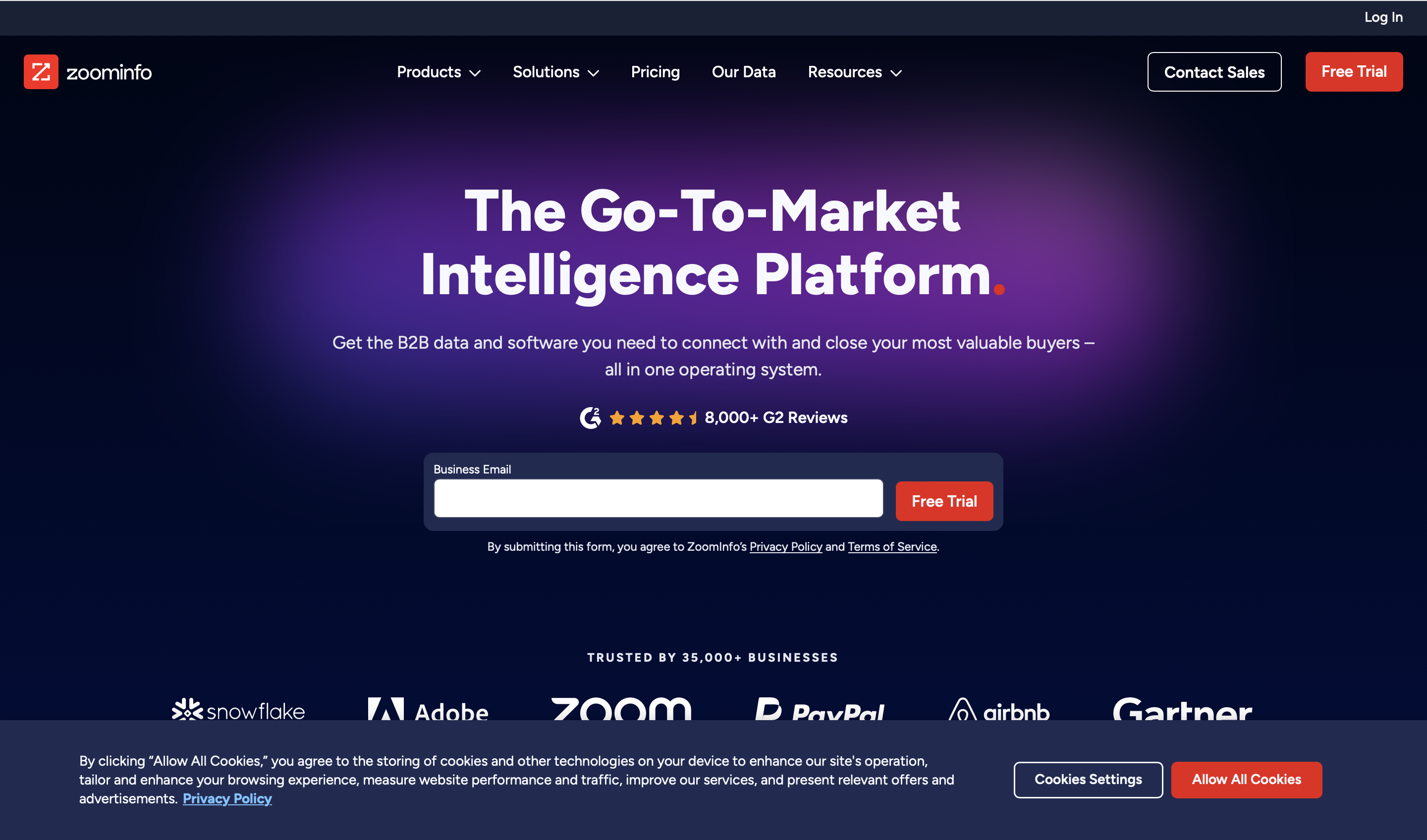
ZoomInfo combines traditional sales intelligence with account-based features, offering buyer behavior insights alongside comprehensive contact and company data within an integrated platform.
Integrated account and contact intelligence:
ZoomInfo's account intelligence integrates seamlessly with contact discovery and company data, providing comprehensive prospect insights that combine buyer signals with decision-maker identification and contact information.
The platform's extensive database enables account signal correlation with firmographic and technographic data, helping teams understand organizational characteristics and buying potential beyond isolated behavioral analysis.
Intent monitoring and engagement tracking:
Built-in intent data capabilities monitor content consumption and research behavior to identify accounts showing buyer interest and optimal timing for sales engagement.
Scoops feature provides account intelligence through company news, funding announcements, and organizational changes that often correlate with increased solution evaluation activity.
Sales engagement integration:
Account intelligence connects directly to sales engagement tools and CRM systems, enabling immediate outreach coordination based on buyer behavior and demonstrated account interest.
Comprehensive contact discovery ensures teams can act on account intelligence with verified decision-maker information and multiple engagement options for effective buyer committee outreach.
Investment considerations and geographic focus:
Pricing typically begins around $1,250 monthly for meaningful account intelligence functionality, with comprehensive capabilities often requiring premium packages for full feature access.
Account intelligence monitoring shows strongest performance in North American markets and technology sectors, potentially limiting effectiveness for international teams or specialized industries.
Sales-focused ABM scenarios: Sales organizations seeking integrated account intelligence with comprehensive prospect development find ZoomInfo's combined approach valuable, particularly for North American technology market focus.
4. Terminus
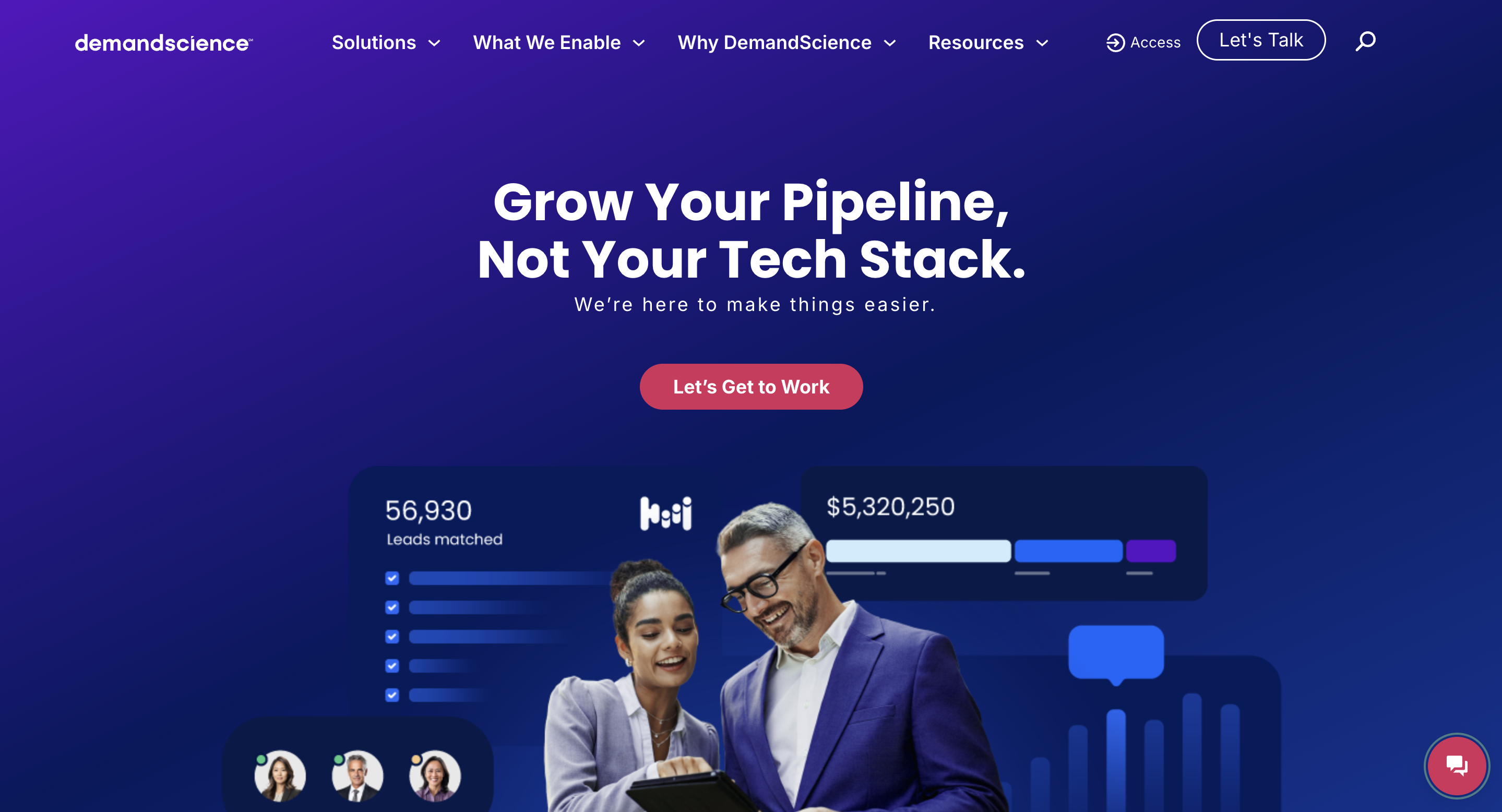
Terminus focuses on providing accessible account-based marketing automation for mid-market organizations, combining account intelligence with campaign orchestration at more approachable price points than enterprise-focused alternatives.
Mid-market ABM accessibility:
Terminus designed its platform specifically for growing companies implementing account-based marketing without enterprise-level resources or extensive technical teams.
Pricing models and feature complexity target organizations with $10-100 million revenue ranges seeking sophisticated ABM capabilities without the investment considerations of enterprise-only platforms.
Account intelligence and engagement coordination:
The platform combines account behavior monitoring with advertising, email, and content orchestration to provide coordinated account-based experiences across multiple touchpoints.
Campaign automation based on account intelligence enables personalized engagement at scale while maintaining the human touch required for effective B2B relationship building.
Implementation and user experience focus:
Terminus emphasizes rapid implementation and user-friendly interfaces that reduce the technical expertise required for effective ABM program deployment and ongoing optimization.
Guided setup processes and pre-built templates help teams launch account-based campaigns quickly without extensive configuration or technical customization requirements.
Account intelligence scope and integration:
Account behavior monitoring includes website activity, content engagement, and basic intent signals, though with less sophistication than comprehensive enterprise platforms.
Integration capabilities support most common marketing automation and CRM platforms, though with potentially fewer customization options than enterprise-focused alternatives.
Growing organization scenarios: Mid-market companies implementing their first sophisticated ABM programs find Terminus's accessible approach valuable for building account-based capabilities without overwhelming complexity or investment requirements.
5. Bombora
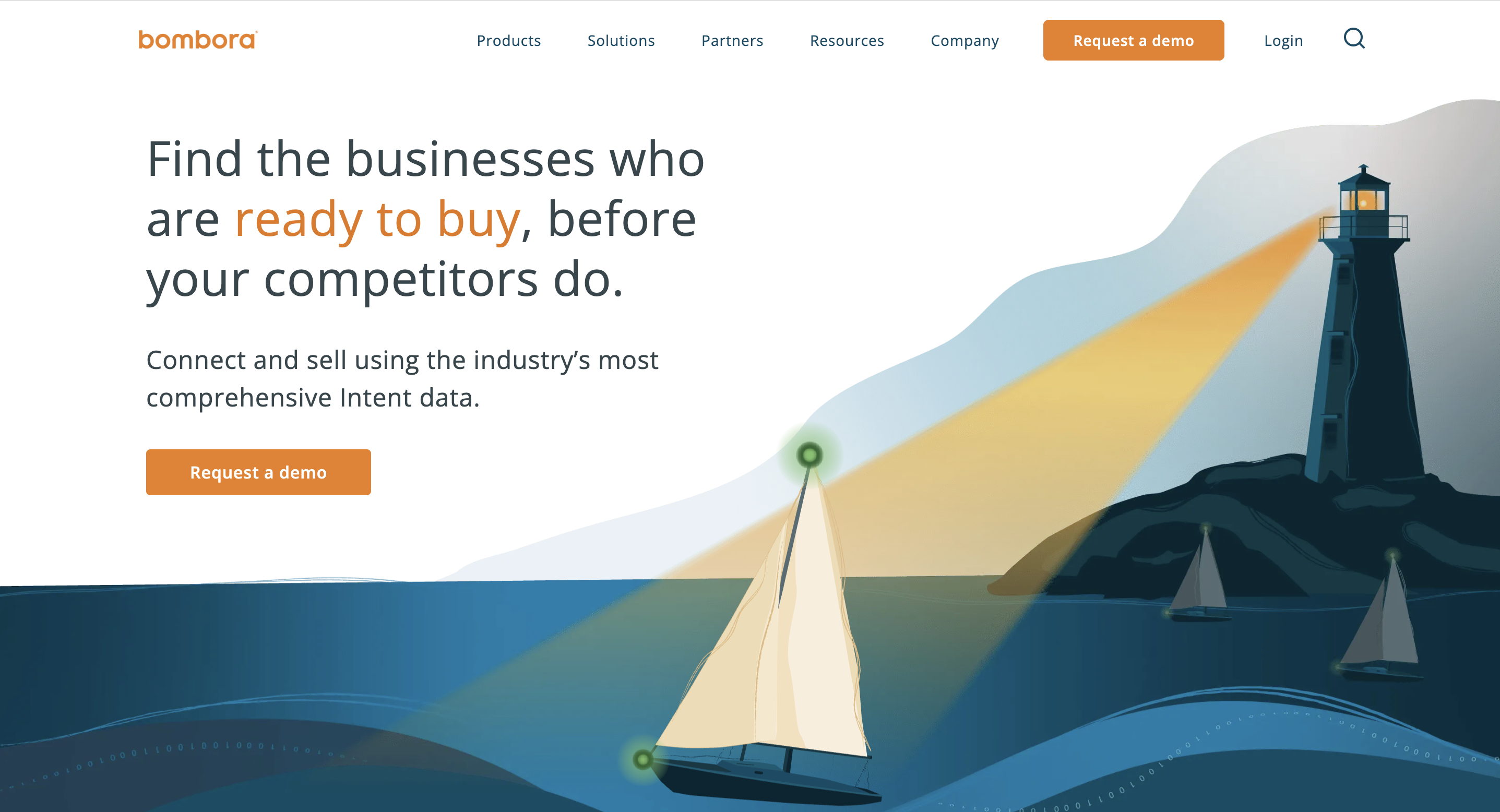
Bombora specializes in B2B intent data by monitoring content consumption patterns across business publications and websites to identify accounts actively researching specific topics and solutions.
Content network intelligence:
Bombora's intent data emerges from comprehensive monitoring of business publication readership and content engagement across an extensive network of B2B content properties.
Topic-based intent scoring identifies accounts researching specific solution categories, providing strategic intelligence for timing sales outreach and marketing engagement.
Account-level intent focus:
The platform emphasizes account-level intent rather than individual behavior, helping teams understand organizational research patterns and buying committee engagement across multiple stakeholders.
Intent signal aggregation provides insights into research depth and duration that help predict buying stage progression and optimal engagement timing for sales teams.
Integration and activation capabilities:
Bombora integrates with major marketing automation platforms and CRM systems to enable automated campaign activation based on intent signal detection and account prioritization.
Account scoring and alerting features help sales teams focus efforts on accounts most likely to convert based on demonstrated research behavior and topic engagement.
Enterprise pricing and implementation:
Custom pricing models typically require annual commitments exceeding $50,000 for meaningful intent coverage, which may put comprehensive account intelligence beyond reach for smaller teams.
Implementation complexity often requires marketing operations expertise and extensive integration work to achieve effective intent signal activation and campaign orchestration.
Intent-focused scenarios: Organizations prioritizing high-quality intent data and willing to invest in enterprise-level implementation find Bombora's specialized approach valuable, though cost and complexity considerations may affect accessibility.
➔ Get an in-depth look at Databar.ai compared to Bombora
Advanced Account Intelligence: Modern Buyer Research and Analysis
Contemporary account intelligence goes beyond basic web analytics. It includes studying buyer behavior across various research methods and interaction points.
Multi-channel research pattern recognition understands that modern buyers look for solutions on many platforms, such as industry publications, review sites, social networks, vendor websites, and professional communities. Effective platforms watch these different channels to give a complete view of the buyer’s journey.
Anonymous buyer committee analysis recognizes that B2B purchases usually involve several people who research separately before coming together to make a decision. Advanced platforms can identify and track these unknown researchers within target companies to better understand how the group works and how far along they are in the buying process.
Predictive engagement timing uses past buyer behavior to predict the best times for sales and marketing teams to reach out. It looks at how intensely buyers are researching, what content they are viewing, and signals from the organization to find the right moment to engage.
6. HubSpot Marketing Hub
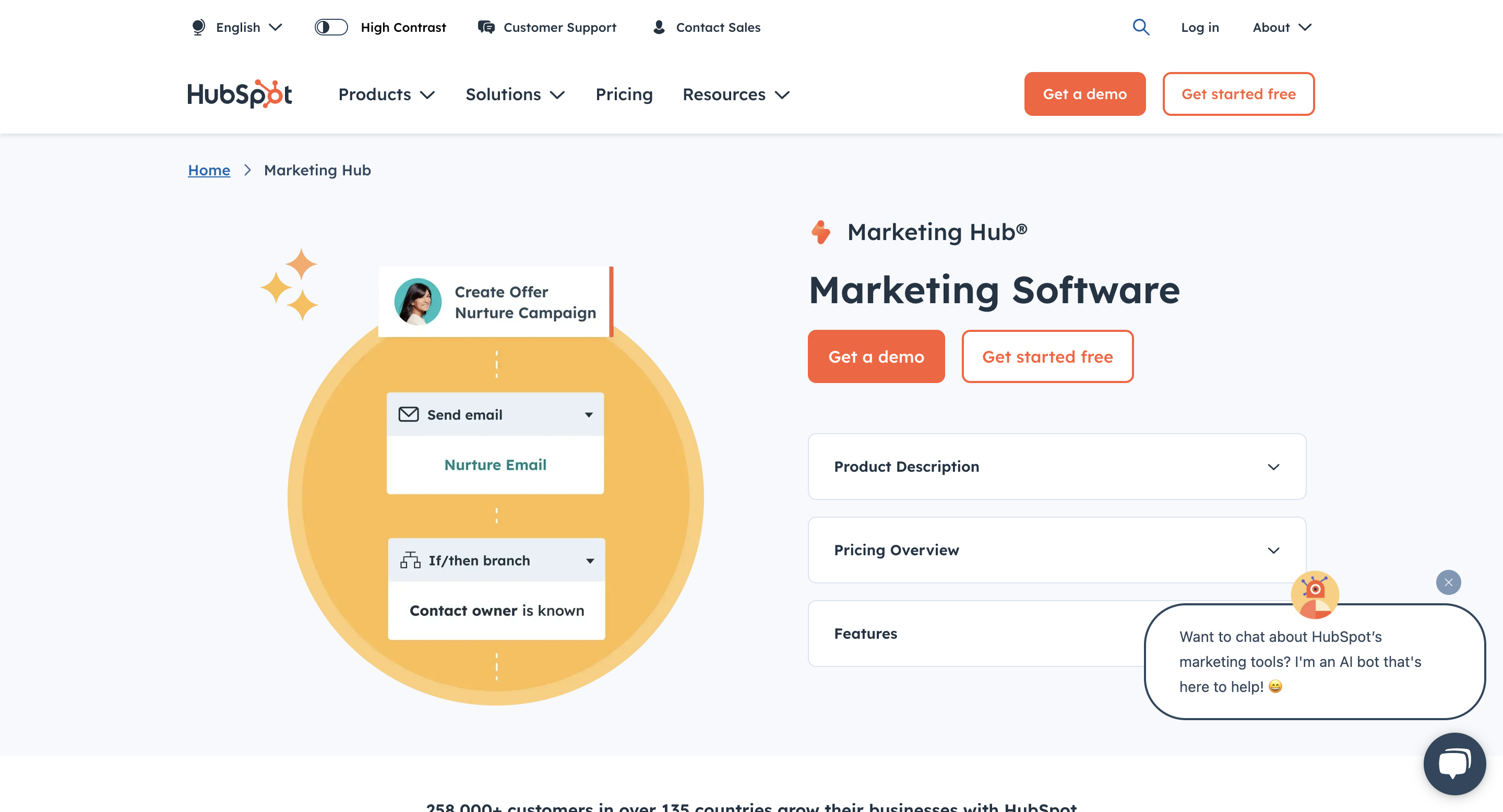
HubSpot combines account intelligence capabilities with comprehensive marketing automation and CRM functionality, providing coordinated account-based features within a broader growth platform.
Integrated growth platform benefits:
HubSpot's account intelligence integrates with contact management, email marketing, content creation, and sales automation to provide coordinated account-based experiences within a unified platform.
The platform's comprehensive feature set reduces the need for multiple specialized tools while providing account behavior tracking and engagement orchestration capabilities.
Account tracking and behavior analysis:
Company insights and tracking features monitor account engagement across website visits, content consumption, email interactions, and sales touchpoints to provide comprehensive buyer journey visibility.
Account-based reporting helps teams understand engagement patterns and buying stage progression across target accounts and buying committee members.
Accessibility and implementation advantages:
HubSpot's user-friendly interface and extensive educational resources make account intelligence accessible to teams without specialized technical expertise or dedicated marketing operations support.
Flexible pricing tiers allow growing teams to access basic account intelligence capabilities while scaling to more sophisticated features as ABM programs mature.
Platform scope and specialization considerations:
Account intelligence capabilities focus on website behavior and email engagement rather than comprehensive intent monitoring across external content networks and research channels.
The platform's broad focus means account intelligence features may lack the depth and sophistication of specialized ABM platforms, though with advantages in ease of use and integration.
Growing team scenarios: Organizations seeking integrated marketing and sales platforms with basic account intelligence find HubSpot's accessible approach valuable, particularly teams prioritizing ease of use over specialized ABM sophistication.
➔ Connect HubSpot with Databar.ai today
7. Outreach
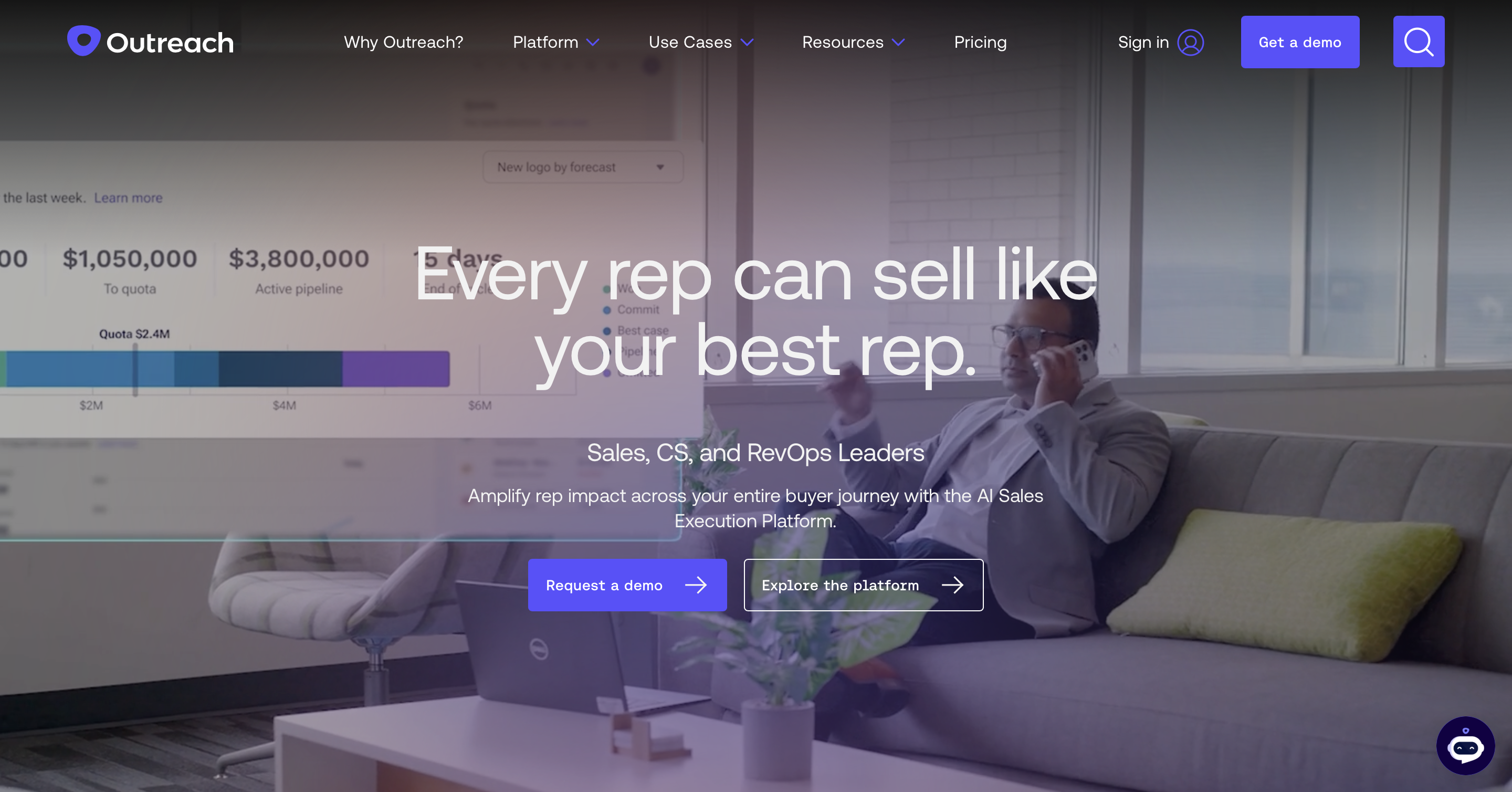
Outreach combines sales engagement automation with account intelligence capabilities, providing buyer behavior insights within comprehensive sales execution workflows.
Sales-focused account intelligence:
Outreach integrates account behavior monitoring with email sequences, call automation, and sales task management to provide coordinated engagement based on buyer signals and demonstrated interest.
Account engagement tracking helps sales teams understand prospect interaction patterns and optimize outreach timing based on demonstrated buyer behavior and response patterns.
Multi-touch engagement coordination:
The platform coordinates email, phone, social, and content engagement based on account intelligence, enabling personalized outreach at scale while maintaining human connection and relationship focus.
Account-based sequences allow teams to orchestrate coordinated engagement across multiple stakeholders within target accounts based on buying committee roles and demonstrated interests.
Sales execution integration advantages:
Account intelligence directly informs sales activities without requiring separate platforms or complex data correlation, enabling immediate action on buyer signals and engagement opportunities.
Comprehensive sales analytics help teams understand the relationship between account intelligence and sales outcomes, enabling continuous optimization of engagement strategies.
Account intelligence scope considerations:
Focus on sales engagement means limited coverage of broader buyer research patterns and intent signals that occur outside direct sales interactions and email engagement.
Account intelligence primarily emerges from prospect engagement with sales outreach rather than comprehensive monitoring of external research behavior and content consumption.
Sales-driven scenarios: Sales teams prioritizing engagement automation with basic account intelligence find Outreach's sales-focused approach valuable, though comprehensive ABM programs may require additional intelligence sources.
8. Rollworks (AdRoll B2B)
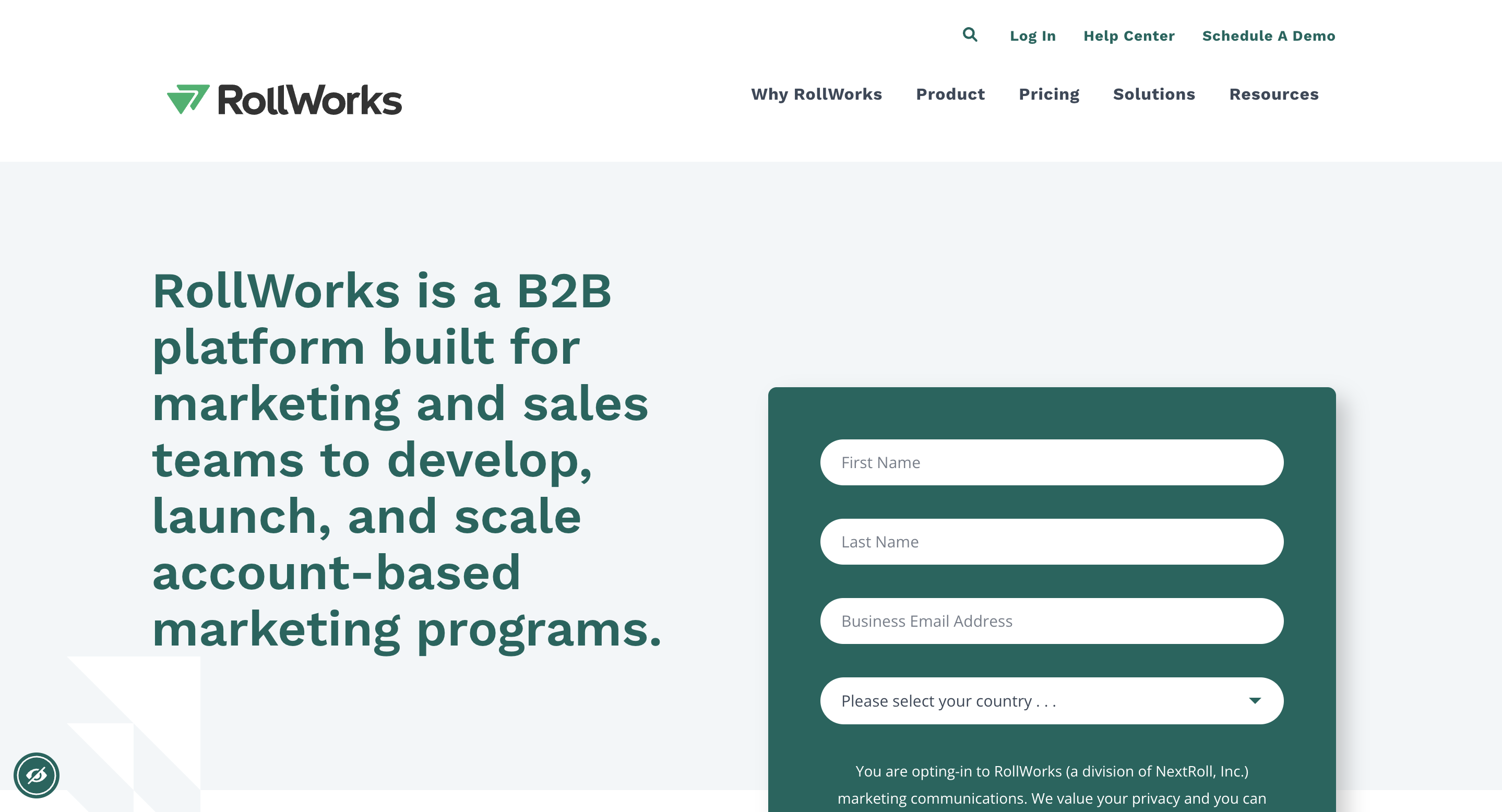
Rollworks specializes in account-based advertising with intelligence capabilities that identify target accounts and coordinate advertising engagement across multiple digital channels.
Account identification and targeting:
Rollworks combines firmographic data with behavioral signals to identify target accounts and coordinate advertising engagement across display, social, and search channels.
Account intelligence helps optimize advertising spend by focusing campaigns on accounts showing buying behavior and demonstrated interest in relevant solution categories.
Cross-channel advertising coordination:
The platform orchestrates advertising engagement across multiple channels based on account behavior and buying stage identification, providing coordinated brand exposure and nurture campaigns.
Account journey tracking through advertising interactions helps teams understand engagement progression and optimize campaign messaging for maximum effectiveness.
Advertising-focused intelligence scope:
Account intelligence primarily serves advertising optimization rather than comprehensive buyer research analysis or sales engagement coordination.
The platform's focus on advertising channels means limited visibility into broader buyer research patterns that occur outside digital advertising touchpoints.
Digital marketing automation:
Integration with marketing automation platforms enables coordinated campaigns that combine advertising engagement with email nurturing and content delivery based on account intelligence.
Campaign analytics help teams understand advertising effectiveness and account engagement patterns across different channels and messaging approaches.
Advertising-centric scenarios: Marketing teams focused on account-based advertising find Rollworks valuable for coordinating digital campaigns, though comprehensive ABM programs may require additional intelligence and engagement platforms.
Strategic Intelligence Categories: Understanding Platform Approaches
Modern account intelligence platforms can be grouped into different categories based on what they focus on and what they do best. Each type serves different needs and goals within an organization.
Comprehensive ABM platforms, such as Databar.ai and Demandbase, offer complete account intelligence along with tools to coordinate engagement. These platforms are designed for companies running advanced account-based marketing programs across many channels and customer touchpoints.
Sales intelligence platforms like ZoomInfo and Outreach mix insights about account behavior with contact information and tools for sales outreach. Their main goal is to help sales teams act quickly, rather than managing wide marketing campaigns.
Specialized intelligence providers, such as Bombora and G2, focus on particular kinds of data, like tracking buyer intent or research habits. They often work as parts of larger ABM technology systems.
Integrated growth platforms like HubSpot include account intelligence as part of full marketing and sales toolsets. This approach appeals to teams looking for all-in-one solutions instead of separate specialized tools.
9. Marketo Engage
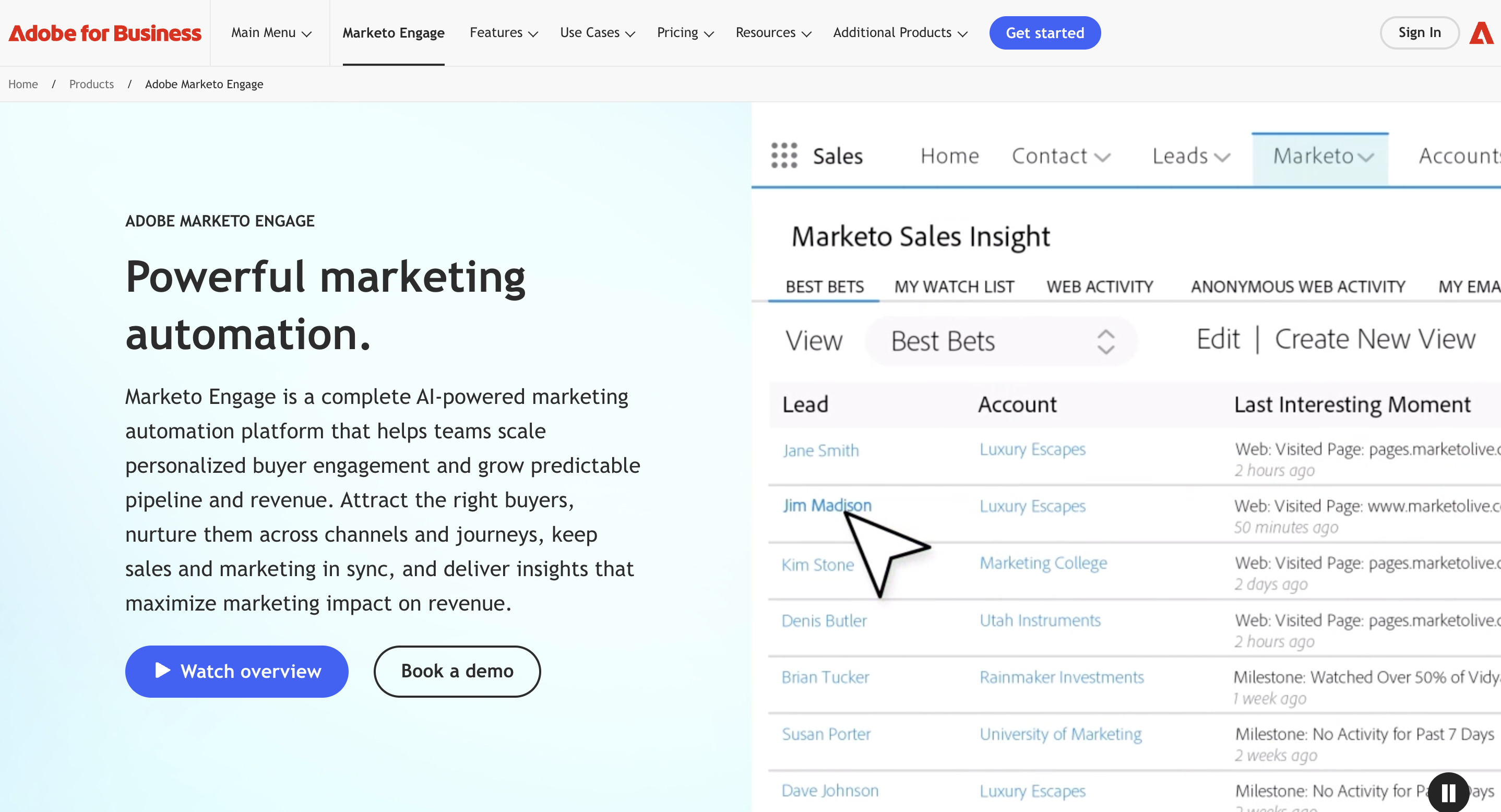
Marketo combines sophisticated marketing automation with account-based marketing capabilities, providing account intelligence within comprehensive campaign orchestration for enterprise marketing organizations.
Enterprise marketing automation integration:
Marketo's account intelligence integrates with advanced marketing automation workflows, enabling sophisticated campaign orchestration based on account behavior and buying stage identification.
The platform's comprehensive automation capabilities support complex, multi-touch account nurturing campaigns that coordinate email, content, events, and sales engagement based on buyer signals.
Account scoring and progression tracking:
Advanced scoring algorithms combine account behavior with engagement history to identify high-value accounts and optimal timing for sales handoff and increased engagement intensity.
Account journey analytics help teams understand buyer progression patterns and optimize campaign effectiveness across different account segments and industry verticals.
Enterprise complexity and resource requirements:
Marketo targets large enterprises with sophisticated marketing operations, requiring substantial technical expertise for effective deployment and ongoing campaign optimization.
Platform complexity and feature depth may overwhelm smaller teams seeking straightforward account intelligence without comprehensive marketing automation sophistication.
Implementation and integration considerations:
Deep integrations with CRM and sales engagement platforms enable coordinated account-based experiences, though implementation often requires extensive technical configuration and ongoing optimization.
Custom pricing models typically require significant annual investments that align with enterprise marketing budgets rather than mid-market accessibility requirements.
Enterprise marketing scenarios: Large marketing organizations with dedicated automation teams and sophisticated campaign requirements find Marketo's comprehensive approach valuable, though smaller teams may require more accessible solutions.
10. Pardot (Salesforce Marketing Cloud Account Engagement)
Pardot provides account intelligence within the Salesforce ecosystem, offering buyer behavior insights and marketing automation tightly integrated with Salesforce CRM capabilities.
Salesforce ecosystem integration advantages:
Pardot's account intelligence integrates seamlessly with Salesforce CRM, providing unified account views that combine buyer behavior with sales interaction history and opportunity management.
Native integration eliminates data synchronization challenges while ensuring account intelligence directly informs sales activities and CRM workflows without additional technical complexity.
Account grading and lead scoring:
Comprehensive scoring algorithms evaluate both account-level engagement and individual prospect behavior to identify high-value opportunities and optimal sales engagement timing.
Account engagement tracking across email, website, content, and event interactions provides holistic buyer journey visibility within familiar Salesforce reporting and analytics frameworks.
Marketing automation and nurturing:
Sophisticated email marketing and nurture campaign capabilities enable account-based engagement orchestration based on buyer behavior and demonstrated interest patterns.
Campaign automation based on account intelligence helps teams deliver personalized experiences at scale while maintaining the relationship focus required for effective B2B marketing.
Salesforce ecosystem requirements:
Pardot requires Salesforce CRM implementation, limiting accessibility for teams using alternative CRM platforms or seeking standalone account intelligence solutions.
Pricing reflects Salesforce's enterprise focus, with meaningful account intelligence capabilities typically requiring investment levels that may exceed mid-market budgets.
Salesforce-committed scenarios: Organizations already invested in Salesforce ecosystem find Pardot's integrated approach valuable for unified account intelligence and sales coordination, though platform-agnostic teams may require alternative solutions.
11. Metadata
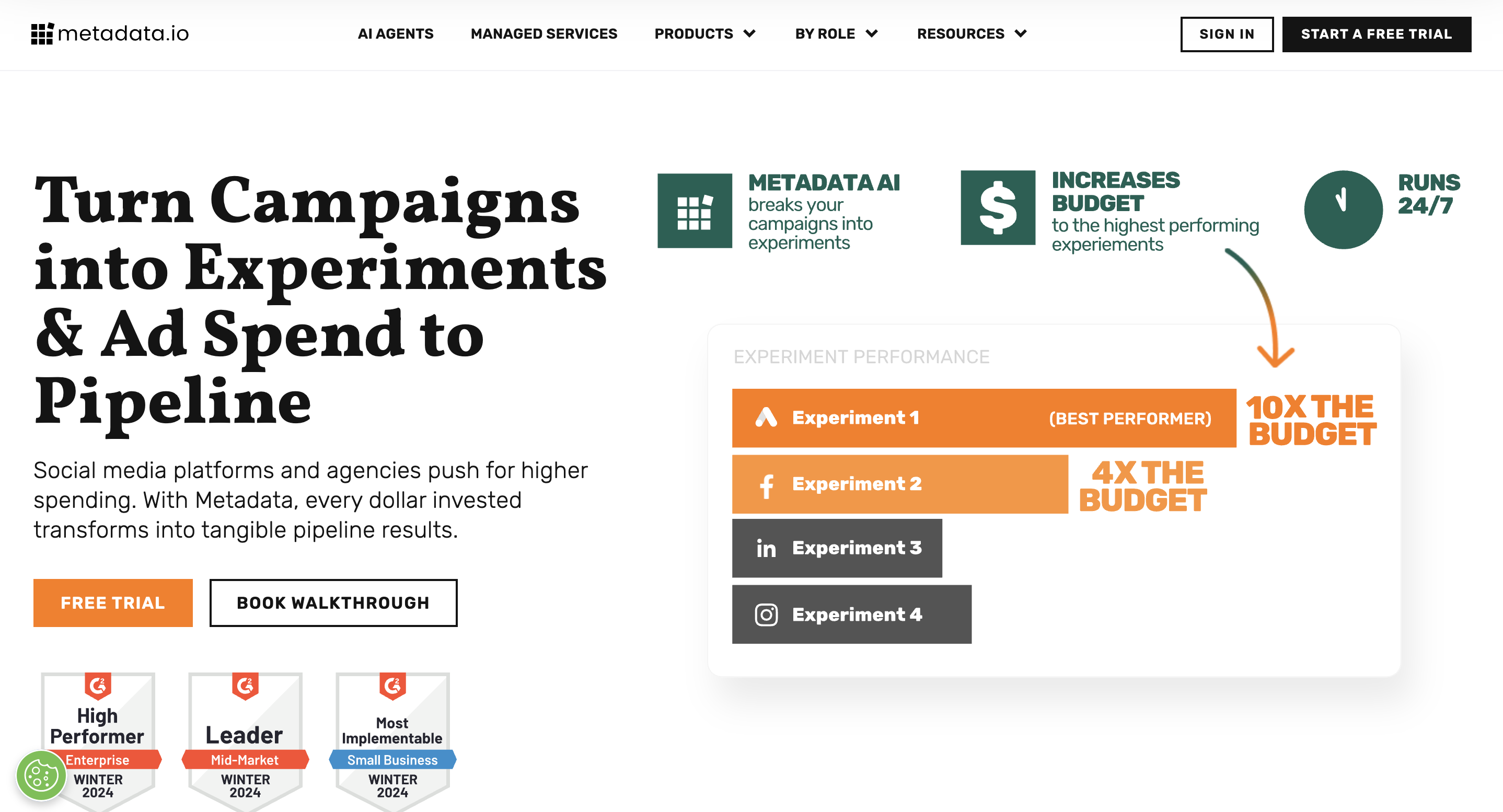
Metadata specializes in automated campaign optimization with account intelligence that identifies high-performing audiences and optimizes advertising spend across multiple digital channels.
Automated campaign optimization:
Metadata uses machine learning to analyze account engagement patterns and automatically optimize advertising campaigns for maximum account engagement and conversion effectiveness.
The platform's automation capabilities reduce manual campaign management while improving account targeting accuracy through continuous learning and optimization algorithms.
Cross-channel campaign intelligence:
Account behavior analysis across display, social, search, and retargeting campaigns provides comprehensive insights into buyer engagement patterns and optimal channel allocation.
Campaign performance analytics help teams understand which accounts engage most effectively across different channels and messaging approaches.
Account audience optimization:
Machine learning algorithms continuously refine target account identification based on engagement patterns, conversion behavior, and demonstrated buyer interest signals.
Automated audience creation and optimization reduce manual audience management while improving campaign effectiveness through data-driven account selection and prioritization.
Campaign-focused scope considerations:
Primary focus on advertising campaign optimization means limited visibility into broader buyer research patterns and engagement activities outside paid media channels.
Account intelligence serves campaign automation rather than comprehensive ABM program orchestration, requiring additional tools for complete account-based marketing implementation.
Digital advertising scenarios: Marketing teams focused on automated advertising optimization find Metadata valuable for campaign efficiency, though comprehensive ABM programs may require broader account intelligence and engagement platforms.
12. Drift
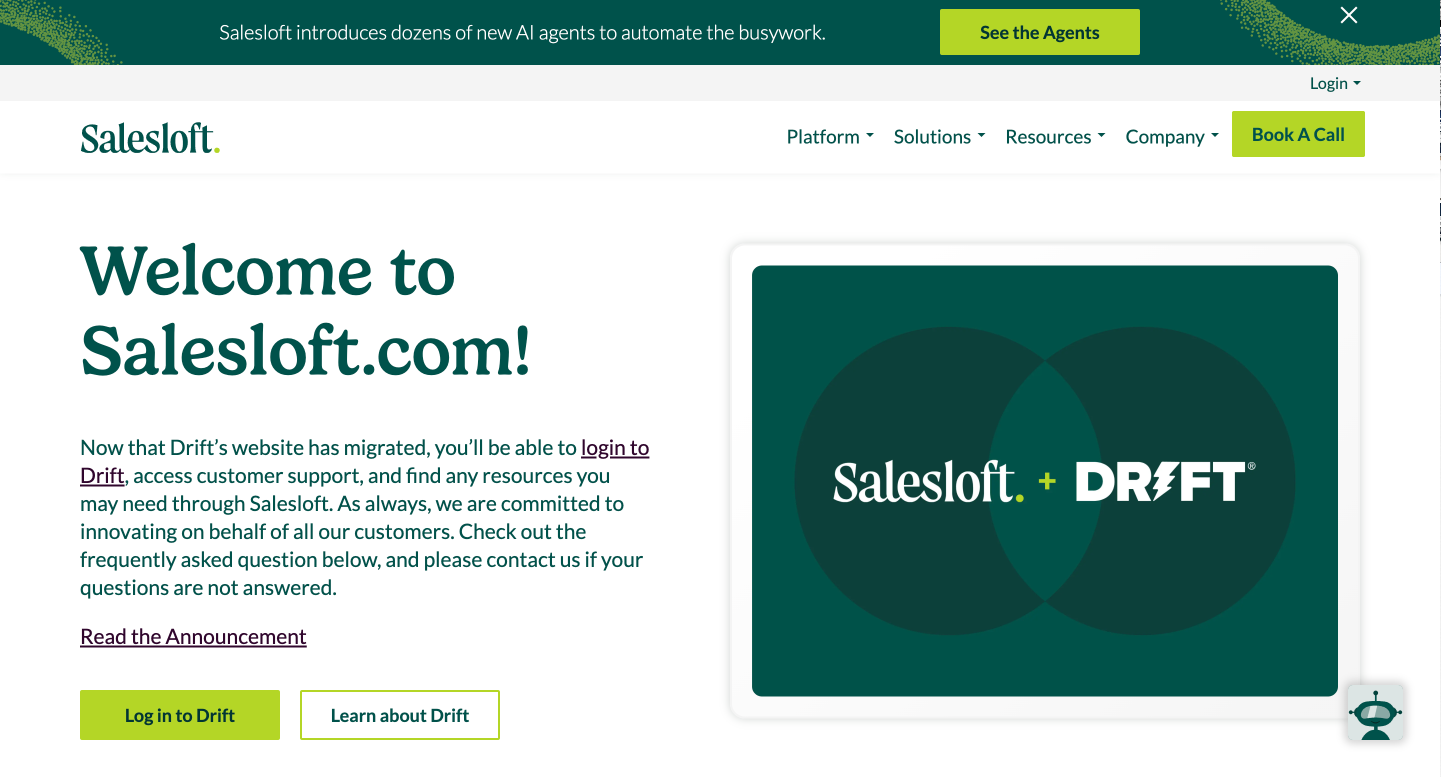
Drift combines conversational marketing with account intelligence, providing buyer behavior insights through website chat interactions and visitor identification for real-time engagement opportunities.
Real-time visitor intelligence:
Drift identifies website visitors in real-time and provides account context that enables personalized chat interactions based on company information and demonstrated interest patterns.
Conversational intelligence helps teams understand buyer priorities and qualification criteria through direct interaction rather than relying solely on behavioral analysis and intent signals.
Account-based chat orchestration:
The platform enables account-specific chat experiences with customized messaging and routing based on company characteristics and demonstrated buyer behavior patterns.
Playbook automation provides guided conversation flows optimized for different account types and buying stages, improving qualification effectiveness and buyer experience quality.
Immediate engagement advantages:
Real-time account identification enables immediate engagement with high-value prospects while they demonstrate active interest through website visits and content consumption.
Conversational approach provides direct buyer insights and qualification opportunities that complement traditional account intelligence and behavioral analysis methods.
Conversational scope and coverage considerations:
Account intelligence primarily emerges from website visits and chat interactions rather than comprehensive buyer research monitoring across external channels and content networks.
The platform's focus on conversational engagement means limited visibility into broader account behavior patterns that occur outside website interactions.
Conversational marketing scenarios: Teams prioritizing real-time engagement and conversational marketing find Drift valuable for immediate buyer interaction, though comprehensive account intelligence may require additional monitoring and analysis platforms.
The range of platforms examined demonstrates the evolution of account intelligence beyond traditional approaches. While each solution offers distinct advantages for specific use cases, modern revenue teams increasingly require comprehensive coverage that addresses multiple aspects of buyer research and engagement.
Account-based marketing requires comprehensive account intelligence, not just intent signals. In case you're wondering how we compare to other products, here's how our platform supports complete ABM strategies when evaluating 6sense alternatives:
- Our accessibility vs ZoomInfo - Accessible ABM intelligence with streamlined implementation processes
- Databar.ai compared to Apollo.io - ABM-focused account research with specialized workflow capabilities
- How we enhance vs Bombora - Multi-source account intelligence with broader signal coverage
- Our platform vs Crunchbase - Dynamic ABM data with real-time intelligence updates
- Databar.ai versus Clay - User-friendly ABM workflows with immediate implementation value
Implementation Strategy: Choosing Your Account Intelligence Approach
Selecting the optimal account intelligence platform requires careful evaluation of organizational requirements, technical capabilities, and strategic ABM objectives rather than simply comparing feature lists or pricing models.
Assessment of Current Capabilities and Requirements:
Begin by evaluating your existing marketing technology stack, technical resources, and ABM sophistication to determine which platform approach aligns with current capabilities and growth trajectory.
Document specific account intelligence needs including industry focus, buyer research patterns, and engagement coordination requirements that will guide platform selection and implementation planning.
Budget and Timeline Considerations:
Consider total cost of ownership including implementation, training, and ongoing optimization requirements rather than just subscription costs when evaluating platform alternatives.
Assess timeline requirements for account intelligence value creation, balancing immediate needs against long-term ABM sophistication and platform capability development.
Integration and Workflow Planning:
Evaluate how account intelligence will integrate with existing CRM, marketing automation, and sales engagement platforms to ensure seamless workflow coordination and data consistency.
Plan for user adoption and training requirements, considering team expertise levels and change management needs for effective platform deployment and ongoing optimization.
Success Metrics and Optimization Framework:
Establish clear success metrics for account intelligence including engagement improvement, pipeline acceleration, and revenue attribution to guide platform selection and ongoing optimization efforts.
Create feedback loops and optimization processes that enable continuous improvement of account intelligence effectiveness and ROI measurement across sales and marketing activities.
Conclusion: Selecting Your Account Intelligence Solution
In 2025, the account intelligence market provides strong alternatives to 6sense's enterprise-centered model, focusing on easy access, fast implementation, and low costs—factors that often hold back many teams from fully using account-based marketing strategies.
Databar.ai emerges as the standout choice for most revenue teams, combining comprehensive account intelligence through multiple specialized providers, immediate implementation value, and accessible pricing starting at $39 monthly. The platform's multi-source approach provides enterprise-grade account insights without enterprise complexity or extensive resource requirements. For teams with specific needs, specialized alternatives offer targeted value: Demandbase for sophisticated enterprise ABM, Terminus for mid-market accessibility, and Bombora for specialized intent monitoring.
The key insight for modern revenue teams is that effective account intelligence requires accessibility, comprehensive coverage, and immediate actionable insights rather than complex enterprise platforms with extended implementation cycles. The future belongs to flexible, multi-source platforms that democratize sophisticated account intelligence while providing the depth and accuracy that strategic ABM programs demand.
Ready to experience accessible, extensive account intelligence?
Start your free trial with Databar.ai →
No credit card required.
Related articles

How to Build Claude Code Skills for GTM (With Templates)
Master GTM Automation with Step-by-Step Claude Code Skill Templates
by Jan, February 26, 2026

Claude Code for GTM Engineers: The Practical Guide to Building Campaigns in 2026
How GTM engineers can save time and boost accuracy with Claude Code
by Jan, February 25, 2026
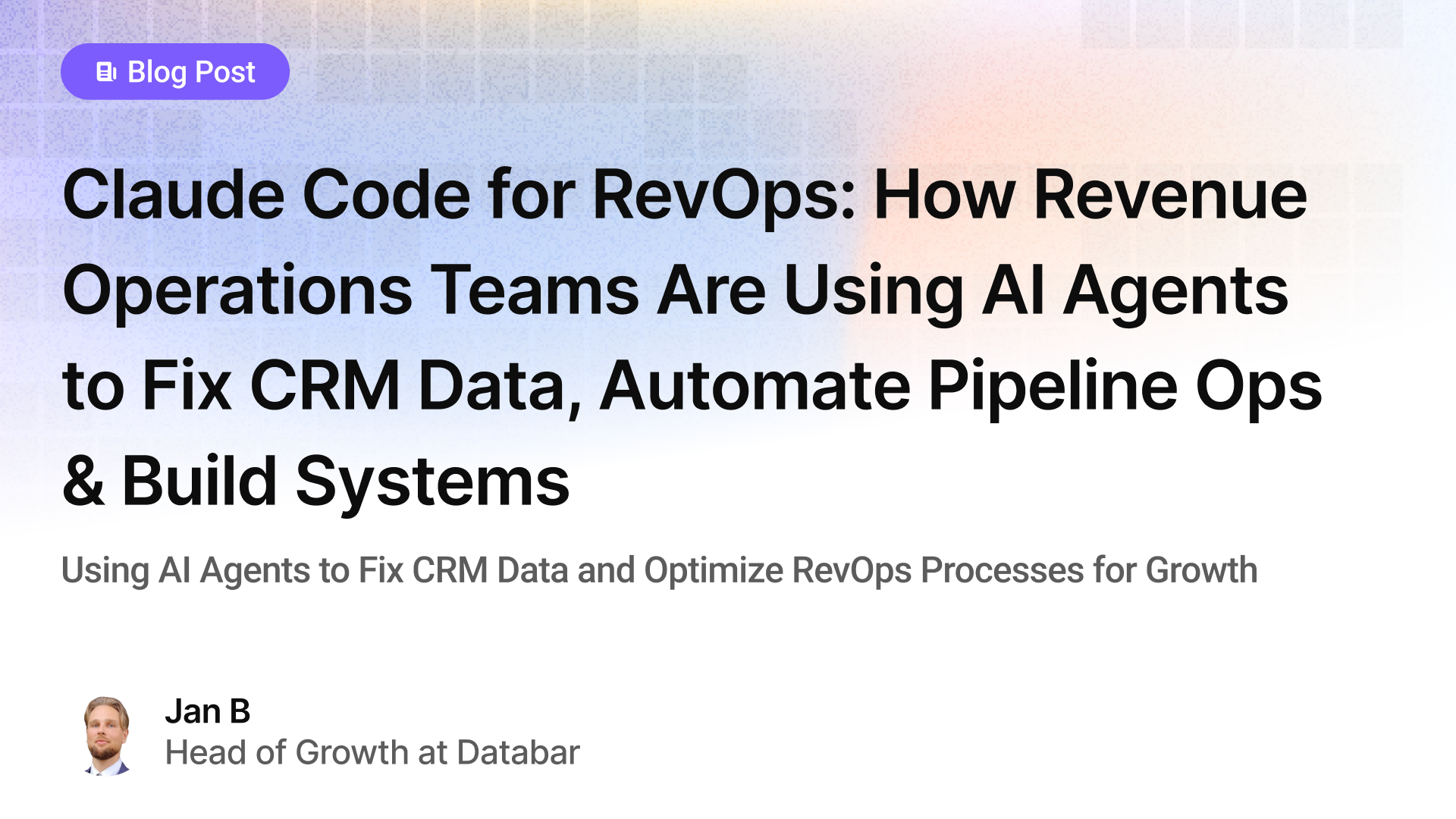
Claude Code for RevOps: How Revenue Operations Teams Are Using AI Agents to Fix CRM Data, Automate Pipeline Ops & Build Systems
Using AI Agents to Fix CRM Data and Streamline Revenue Operations for Scalable Growth
by Jan, February 24, 2026
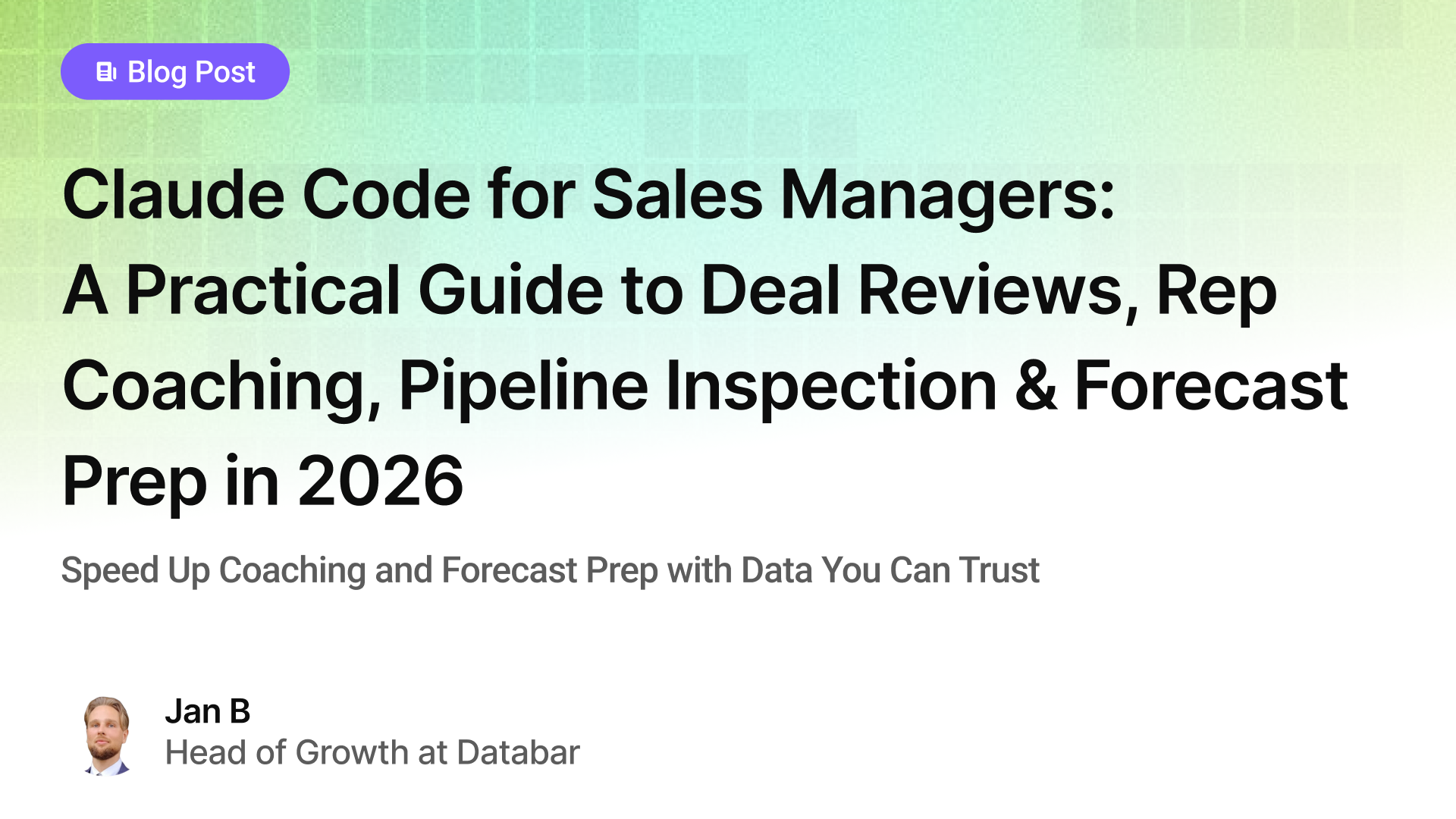
Claude Code for Sales Managers: A Practical Guide to Deal Reviews, Rep Coaching, Pipeline Inspection, and Forecast Prep in 2026
Speed Up Coaching and Forecast Prep with Data You Can Trust
by Jan, February 23, 2026